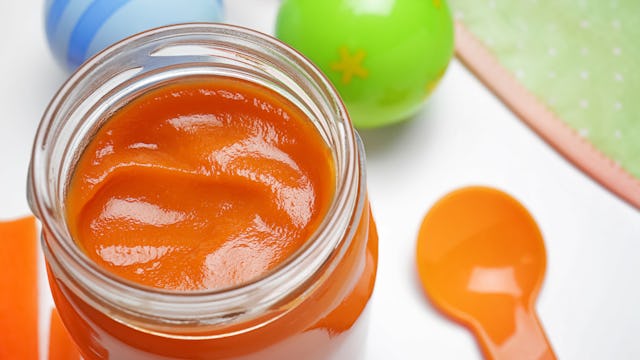Consumer Report Finds 'Worrisome' Levels Of Lead And Arsenic In Baby Food

Most of the leading brands showed elevated levels of heavy metals
Consumer Reports has now issued a warning against heavy metals in some pre-made baby foods leaving most of us to wonder, ‘What exactly can we feed our kids?’
Recently, we’ve seen a number of concerning studies on everything from the risks of microwaving baby bottles and sippy cups to cancer-causing ingredients in cereal to various salmonella outbreaks in Goldfish crackers and eggs. This new report shows many popular baby foods contain concerning levels of heavy metals.
In 2017, the non-profit organization Clean Label Project released findings showing toxins like arsenic, lead, and mercury may be in popular infant formula and baby foods. Now, a recent Consumer Reports confirmed they do, in fact, exist.
The Consumer Reports food safety team tested 50 nationally distributed packaged food including Beech-Nut, Gerber, Baby Mum-Mum, Earth’s Best, Ella’s Kitchen, Happy Baby, and Sprout (among others), testing the products for traces of cadmium, lead, mercury, and inorganic arsenic, according to the report. And what they found is frightening.
At least one of these heavy metals were found in each of the products tested and the contamination levels were deemed “worrisome” in 68 percent of them. Of the 50 tested, products containing rice and sweet potato showed the highest contamination.
According to the report, children in the U.S. eat their share of packaged baby food, which is no surprise because parents are stretched thinner now than ever before (and even if they aren’t, hello it’s convenient). What’s more worrying is these contaminants were found in jarred foods, snacks, cereals, prepared entrées, and packaged fruits and vegetables marketed specifically for infants and toddlers.
And for those of us who feed our kids organic foods to avoid these potential risks, the results were the same. “Organic foods were as likely to contain heavy metals as conventional foods,” the study reported.
“Babies and toddlers are particularly vulnerable due to their smaller size and developing brains and organ systems,” says James E. Rogers, Ph.D., director of food safety research and testing at Consumer Reports. “They also absorb more of the heavy metals that get into their bodies than adults do.” Also, the risks from heavy metals accumulate in the kidneys and other internal organs over time, making it more dangerous the earlier the exposure.
So what can parents do (besides bang our heads against a wall)? If you’re concerned about possible exposure, have your child tested. Experts also suggest limiting the amount of rice cereal you give your baby, rethink how you prepare rice (because it matters), limit packaged snacks (great), and seek out whole foods that contain less heavy metals than packaged items.
“No amount of heavy metals such as lead can be considered safe,” said Rogers, “but less is certainly better.”
For a complete list of impacted foods, please visit Consumerreports.org.